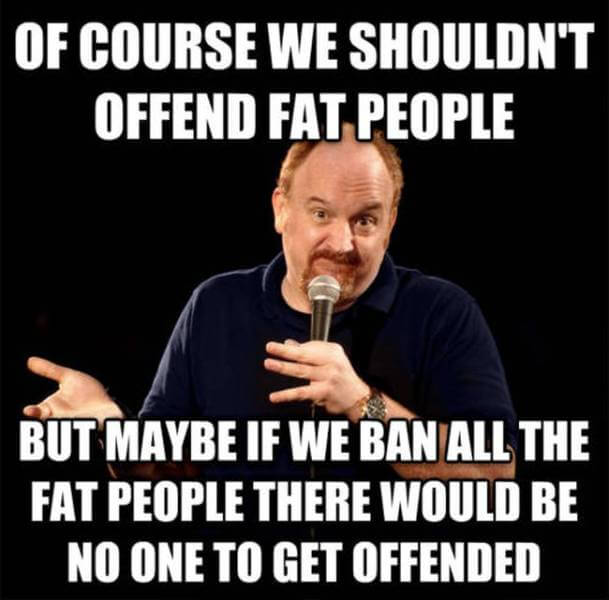In a world where humor is often used as a coping mechanism, the line between funny and offensive can sometimes blur. Fat jokes, in particular, have sparked heated debates over their appropriateness and impact. While some may argue that they are harmless fun, others contend that these jokes perpetuate harmful stereotypes and contribute to a culture of body shaming. The question arises: are fat jokes offensive, or can they be seen as a form of light-hearted humor?
As conversations around body positivity and inclusivity gain momentum, it becomes crucial to examine the implications of fat jokes. Humor can serve as a bridge, connecting people through laughter, but it can also be a weapon that deepens divisions and inflicts emotional pain. This article will explore various aspects of fat jokes, including their history, societal perceptions, and the emotional toll they take on individuals targeted by them.
Ultimately, understanding the context and consequences of fat jokes can help us cultivate a more respectful and compassionate society. By delving into the reasons behind the popularity of such jokes and the potential harm they cause, we can foster a dialogue that prioritizes empathy and awareness over insensitivity.
What Are Fat Jokes and Where Did They Come From?
Fat jokes are humorous remarks or anecdotes that target individuals based on their weight or body size. Historically, humor has often relied on exaggeration and stereotypes, with fatness frequently serving as a punchline. The roots of fat jokes can be traced back to ancient times, where larger body types were associated with prosperity or indulgence but also faced ridicule in various cultural contexts.
Over the decades, societal attitudes towards body image have evolved, yet the prevalence of fat jokes remains. They are often found in comedy routines, television shows, and movies, where characters with larger bodies are depicted as lazy, gluttonous, or lacking self-control. The normalization of such humor raises questions about its impact on societal perceptions of body image and self-worth.
Why Do People Make Fat Jokes?
Understanding the motivations behind fat jokes is essential in addressing their impact. Some common reasons include:
- Societal Norms: Many people grow up in environments where making fun of larger individuals is deemed acceptable.
- Insecurity: Some individuals project their insecurities onto others as a defense mechanism, using humor to mask their own issues with body image.
- Attempting to Fit In: People may resort to fat jokes to gain acceptance or approval from peers, believing that shared laughter will strengthen bonds.
What Are the Emotional Consequences of Fat Jokes?
The emotional toll of fat jokes can be profound. For individuals who experience body shaming, the consequences may include:
- Lowered Self-Esteem: Constant ridicule can lead to a negative self-image and feelings of worthlessness.
- Social Isolation: Those targeted by fat jokes may withdraw from social situations, fearing judgment and ridicule.
- Mental Health Issues: The stress and anxiety stemming from body shaming can exacerbate existing mental health conditions, leading to depression and eating disorders.
Are Fat Jokes Offensive to Society?
The question of whether fat jokes are offensive is subjective and varies from person to person. However, many advocates for body positivity argue that these jokes contribute to a culture of discrimination and reinforce negative stereotypes. In a society striving for inclusivity, the normalization of fat jokes can hinder progress towards acceptance of diverse body types.
How Do Fat Jokes Affect Relationships?
Fat jokes can have a significant impact on personal relationships. When someone makes a fat joke, it can create rifts between friends or family members, leading to:
- Feelings of Betrayal: Those who are targeted may feel betrayed by loved ones who are supposed to offer support.
- Increased Tension: Jokes about weight can create tensions, even among close friends, as they may lead to misunderstandings and hurt feelings.
- Loss of Trust: Making fun of someone's appearance can erode trust, making individuals hesitant to be vulnerable with one another.
What Alternatives Exist to Making Fat Jokes?
Instead of resorting to fat jokes, individuals can explore more inclusive forms of humor. Here are some alternatives:
- Self-Deprecating Humor: Making light of one’s own flaws can foster connection without targeting others.
- Observational Humor: Jokes about shared experiences or relatable situations can be funny without being hurtful.
- Promoting Body Positivity: Humor that celebrates diversity and encourages acceptance can uplift rather than demean.
Can Fat Jokes Ever Be Considered Funny?
The perception of fat jokes as funny largely depends on the context and delivery. In some instances, comedians may use fat jokes in a way that is self-aware and promotes discussion about body image. However, the risk of offending or alienating audience members is always present. Ultimately, humor should be used to unite rather than divide.
What Can We Do to Combat Fat Jokes?
To foster a more inclusive environment, individuals can take proactive steps to combat fat jokes:
- Educate Others: Share information about the harmful effects of fat jokes and promote body positivity.
- Speak Up: If you hear someone making a fat joke, consider addressing it respectfully to challenge the behavior.
- Support Body Positivity Movements: Engage with organizations that advocate for body acceptance and promote positive body image.
Conclusion: Are Fat Jokes Truly Offensive?
In conclusion, fat jokes can be deeply offensive and damaging to individuals and society. While humor is a powerful tool for connection, it must be wielded responsibly. By understanding the implications of fat jokes and choosing to promote inclusivity and respect, we can foster a more compassionate world. Ultimately, the question of whether fat jokes are offensive is one that requires careful consideration and a commitment to empathy.



ncG1vNJzZmixn6PAtr7IZqWeq6RjsLC5jpycpZ2Sp7a1xZBsZp%2BZpGK3sLfErGSonpaau7S11Z5loaydoQ%3D%3D